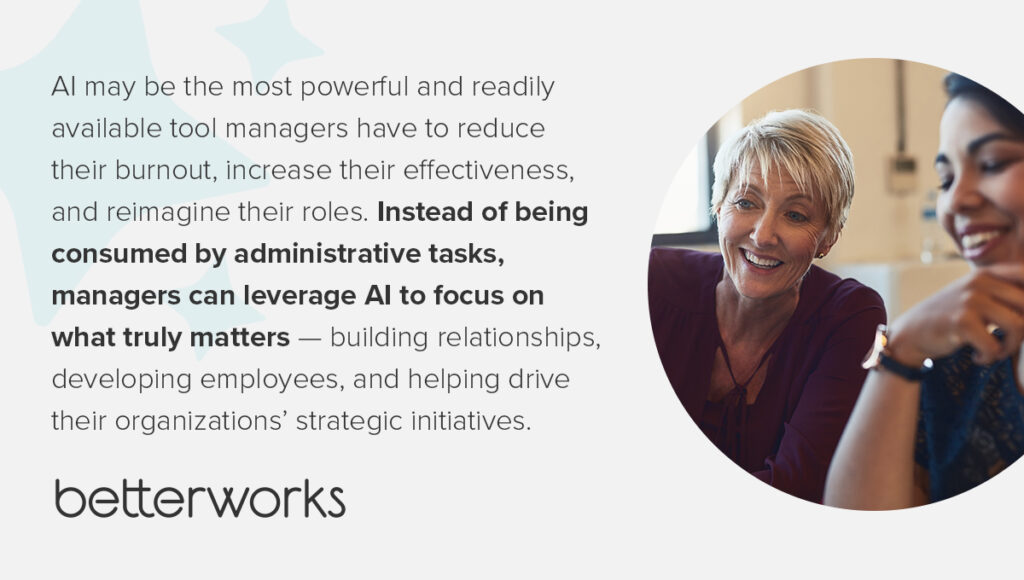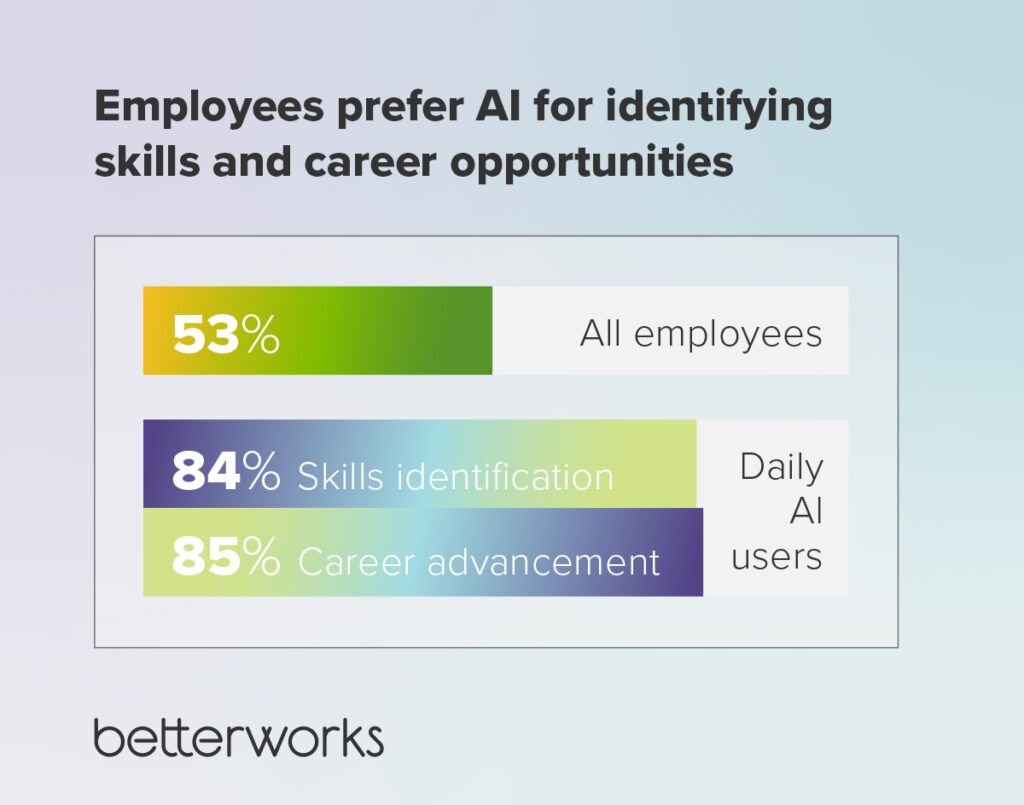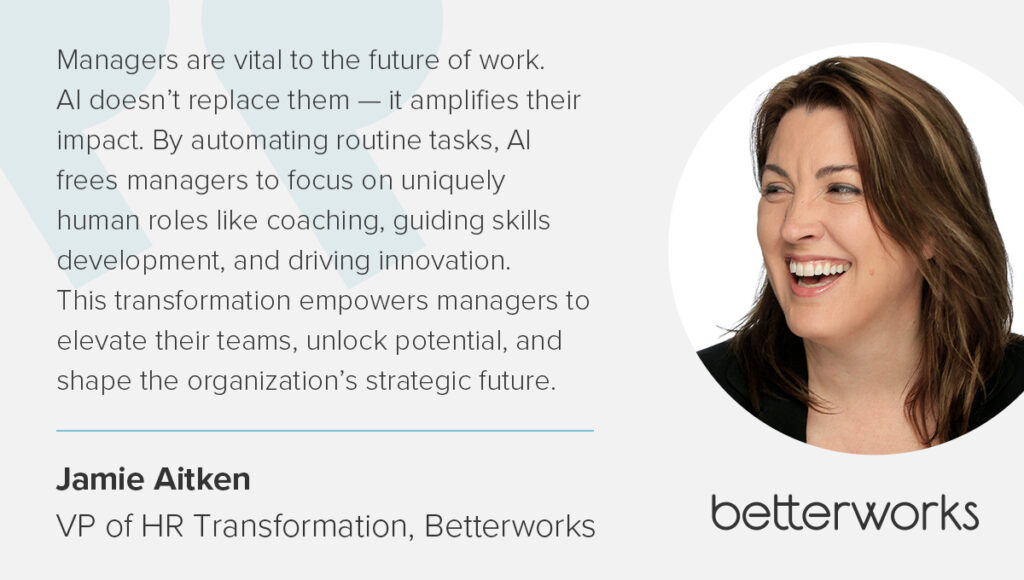It’s no secret that managers are struggling. Many are burned out, overburdened, and lack the tools and training they need to be truly effective. A 2024 study from The Well-Being Project found that over 50% of managers worldwide experience burnout, highlighting a global issue in leadership sustainability. Similarly, the Performance Management 2024 Trends report from RedThread Research found that fewer organizations are investing in resources to support managers, with only 31% providing coaching tools in 2023, down from 36% in 2022.
But here’s what is new: AI may be the most powerful and readily available tool managers have to reduce their burnout, increase their effectiveness, and reimagine their roles. Instead of being consumed by administrative tasks, managers can leverage AI to focus on what truly matters — building relationships, developing employees, and helping drive their organizations’ strategic initiatives.
AI, however, is only as good as the people using it. Leading organizations don’t just give managers AI tools; they train them to use AI strategically while ensuring their teams do the same. This symbiotic relationship between AI and management is where the real transformation happens. Let’s explore how AI can elevate managers — and how managers, in turn, can elevate AI adoption within their teams.

How AI can elevate managers
One of AI’s greatest strengths is automation. By taking repetitive, low-value tasks off managers’ plates, AI allows them to focus on more meaningful work.
For example, AI plays a pivotal role in performance management platforms like Betterworks by speeding and simplifying goal development, performance reviews, and feedback cycles. Instead of spending hours manually calibrating performance data, managers can get clear, data-driven insights in real time, ensuring fairer and more effective decision-making.
This shift is crucial because 9 in 10 managers report facing heavier workloads, according to Betterworks’ 2024 State of Performance Enablement report. AI reduces administrative friction, allowing managers to dedicate more time to coaching and strategic planning. In fact, more than a third of managers report using AI to increase their efficiency or effectiveness according to that report.
AI as a skills and career development ally
Career development and skill-building are other areas where AI shines and can serve as a co-pilot with managers. Many employees lack confidence in their organizations’ ability to support their skill development. Betterworks’ 2025 State of Performance Enablement report reveals that 53% have access to training for their current roles, and just 30% have training aligned with their career aspirations. AI can fill these gaps by analyzing employee performance and recommending relevant learning paths.
The workforce is ready for this evolution. More than half of employees (53%) and 84% of regular AI users believe AI is best suited for identifying skills gaps and career growth opportunities. The capabilities of AI combined with the sentiments of a majority of employees make for a perfect team: AI spots skills while managers unlock people’s potential.

Managers, once they are freed from administrative burdens, can use these AI-driven insights to provide personalized coaching, assign stretch projects, and connect employees with opportunities that align with their aspirations.
“Managers are vital to the future of work. AI doesn’t replace them — it amplifies their impact,” says Jamie Aitken, VP of HR transformation at Betterworks. “By automating routine tasks, AI frees managers to focus on uniquely human roles like coaching, guiding skills development, and driving innovation. This transformation empowers managers to elevate their teams, unlock potential, and shape the organization’s strategic future.”
AI helps managers build stronger relationships
A study from RedThread Research shows that managers who connect personally with their employees are rated 2.8 times more effective. Yet, only 53% of employees say their manager makes an effort to do so.
By offloading administrative tasks and surfacing actionable insights, AI enables managers to be more present, empathetic, and engaged with their teams.
AI can help by simplifying and enhancing feedback and communication. AI-powered tools, such as those available in the Betterworks platform, use sentiment analysis to surface employee concerns, allowing managers to proactively address issues before they escalate. AI can also generate conversation prompts, ensuring discussions remain productive and focused. AI-assisted feedback summaries and meeting summaries can help managers and their reports better understand pressing issues or needs, more easily recognize employee achievements, and distill career development and skilling aspirations.
How managers can elevate AI adoption
AI is a powerful tool, but it requires human leadership to be effective. With support from HR, managers can play a critical role in fostering AI adoption within their teams, ensuring employees see AI as a collaborator rather than a job taker.
Encouraging AI experimentation
One of the best ways managers can elevate AI is by fostering a culture of experimentation and learning. This means normalizing AI use in weekly and daily workflows and recognizing employees who leverage AI effectively. Team members can share insights and how they’re using AI tools to speed up and improve the quality of their work.
By motivating employees to use AI tools regularly, managers will help them build familiarity, reducing resistance to AI use. This steady approach can ease employees into AI adoption, increasing their comfort and readiness for the future.
Using performance management to drive AI adoption
AI adoption doesn’t happen overnight — it requires a structured approach. HR leaders can use AI-assisted performance management tools like Betterworks to encourage incremental AI integration. For example, managers can encourage employees to use AI-assisted goal-setting and performance management tools to help them craft better goals, improve peer feedback, and even prepare for 1:1s.
To promote AI learning and adoption, managers can ask team members to set at least one AI-related performance goal. This could involve researching AI tools that would help the team or individual improve their work outcomes. For example, employees can use AI to streamline workflows, improve decision-making, or enhance customer interactions.
Managers can also incorporate AI into feedback loops by encouraging employees to share how AI has improved their productivity or problem-solving abilities. Recognizing AI adopters reinforces the behavior and motivates others to follow suit.
Building an AI-learning culture
A learning culture is essential for AI adoption. Managers can work with Learning & Development (L&D) leaders to establish regular training on relevant AI tools to help employees remain competitive and contribute to ongoing innovation.
Additionally, establishing regular team discussions on AI usage — where employees share insights and best practices—can help demystify AI and reduce resistance. Collaboration tools like Teams or Slack also serve as knowledge-sharing channels.
AI isn’t a silver bullet, but when managers take an active role in AI education, adoption rates will increase and teams will build AI fluency to become more innovative and future-ready.

The future of AI and management
AI should not replace managers—it should elevate them. By automating routine tasks, providing real-time insights, and enabling stronger relationships, AI allows managers to focus on what truly matters: people, strategy, and innovation.
At the same time, AI’s success depends on how well managers guide its adoption. The best managers don’t just use AI; they teach their teams to use it effectively, ensuring AI becomes an ally rather than a threat.
The future of work is not AI versus humans—it’s AI and humans, working together to build more engaged, high-performing teams. Managers who embrace this shift will not only reduce their own burnout but also unlock new levels of productivity, creativity, and connection within their teams.
Empower managers with AI. Elevate AI with managers.




